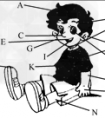根据汉语提示、首字母或用所给词的正确形式完成句子。 1. I often _________ (谈论) about interesting films with my friend Tony. 2. —Excuse me, is this book ______-七年级英语
34.say with a smile 微笑地说
35.be glad to do sth.高兴做某事
36.do a good thing (deed) 做一件好事
37.fall ill=be i11 生病,患病
38.take sb. to a hospital 把某人送到医院
39.rain heavily 下大雨
40.on the road 在公路上
41.not know what to do 不知道该做什么
42.just then 正在那时
43.come up 走进,上来
44.in front of 在……前面
45.thank sb. again and again 反复感谢某人
46.drive away (汽车)离开
run away 跑开
take away 拿走
47.right away 立刻
48.right now 此刻,刚才,现在
49.get home 到家 get there 到达哪儿 get here 到达这儿
50. yesterday morning 昨天晚上
51.leave the hospital 离开医院
52.no buses=not any buses 没有车
53.say to sb.对某人说 say to oneself 自言自语
54.fall off 跌落
55.need to get up early 需要早起床
56.hurt my arm 胳膊受伤
57.What's wrong with you?=What's the matter with you? 你怎么了?
58.do one's homework on the computer 在电脑上做作业
59.have four English lessons 上四节英语课
60.once a week 一周一次 twice a year 一年两次 three times a month 一个月三次
61.do more listening and speaking 做大量的听说练习
do some cleaning 扫除
do some washing 洗衣服
do some shopping 购物
62.make good progress in English 在英语方面取得很大进步
63.help a lot in our studies 在学习上给子很大帮助
64.teach sb. English 教某人英语
65.get to school 到达学校
66.give sb.lessons 给某人上课
67.ask sb.to do sth.要求某人做某事
ask sb.not to do sth.要求某人不要做某事
68.let sb. do sth.让某人做某事
1et sb. not do sth.让某人不要做某事
69.not……until 直到……才
70.make one's lessons interesting 使某人的课上的很有趣
71.tell sb. how to do sth.告诉某人怎样做某事
72.try to learn new things be oneself 设法靠自己学一些新的知识
73.want to be a history teacher 想成为一名历史老师
74.grow up 长大
75.in future 在将来
76.computer room (电脑)机房
77.language lab 语言室
78.finish middle school 中学毕业
79.want to become (be) a designer 想成为一名设计家
80.wish to be doctor 希望成为一名医生
81.an American boy 一个美国男孩儿
82.study in a high school 在高中学习
83.in Grade Eight 在八年级
84.finish primary school 小学毕业
85.start school at the age of seven
=begin to school when I was seven 七岁开始上学
86.move to Washington with his family 和他全家搬到华盛顿
87.be interested in 对……感兴趣
88.want to become a doctor of Chinese medicine 想成为一名中医
89.come here to learn Chinese 来这儿学习中文
90.a nice school 一所好的学校
91.instead of 代替
92.in many ways 在许多方面
93.be different from 与……不同
94.by the way 顺便说
95.come back home 回家
96.be sorry for 为…难过,遗憾
97.feel sorry for 为…难过,遗憾
98.burn away 燃烧没了
99.open the door 开门
100.take sb. in one's arms 拥抱某人
101.have some medicine 吃药
102.have a football match 进行一场足球比赛
103.have a meeting 开会
104.walk back 向后走
105.give sth. back to sb. 把某物还给某人
106. work through the night 通宵工作
107.get through the examinations=pass the exam 通过考试
108.happen to 发生
l09.knock at the door 敲门
110.want to do sth. 想做…
111.fall down 掉下来
112.begin to do sth. 开始做…
113.have some tea 喝茶
114.have sports 进行体育锻炼
115.have a bad coId 得了重感冒
116.have a good time 玩的很高兴
117.keep back 向后退
118.so…that 如此…以至于…
考点名称:形容词
- 形容词:
简称adj.或a,形容词用来修饰名词或代词,表示人或事物的性质、状态,和特征的程度好坏与否,形容词在句中作定语,表语,宾语补足语。
她是一个好学生,她学习努力。She is a good student, and she works hard.
这辆自行车很贵。This bike is expensive.
对不起,我现在很忙。I am sorry, I'm busy now.
你为这次会议做好准备了吗? Have you got everything ready for the meeting? - 形容词的语法功能:
一、作定语
He is the greatest writer alive.他是依然健在的伟大的作家。
Somewone else has done it.别人已经做了这事。
二、作补语
形容词做主语补足语和宾语补足语时,可以表示其现状、状态,也可以表示某一动作的结果,并常用在表示“认为,看待”的动词如believe,prove,consider等候。例如:
The news made her sad.这消息使他感到非常悲伤。
Don't marry young.不要早婚。
三、作状语
形容词或形容词短语可作状语,形容词作状语时,可以看作是“being+形容词”结构的省略,可表示时间、原因、条件、方式、强调或伴随状况等意义。例如:
Enthusiastic,they are co-operative.热心的时候他们是很合作的。
Rich or poor, young or old, we all have problems.不管是穷人还是富人,不管是年轻人还是老人,我们都有问题。
四、做表语
The ship was adrift on unknown seas.那艘船在陌生的海域漂流。
五、做主语
Old and young joined the discussion.
Rich or poor meant the same to him.作感叹语
Very good!Say it again.
Stupid!He must be crasy. 形容词的几个特殊用法:
most 同形容词连用而不用 the, 表示 " 极,很,非常, 十分"。
It's most dangerous to be here. 在这儿太危险。
I cannot do it, it's most difficult. 我干不了这件事,太难了。
"The+形容词比较级..., the+形容词比较级..." 表示 " 越... 就越..."。
The more you study, the more you know. 你学的越多, 就知道的越多。
The more I have, the more I want. 我越有就越想要有。
The more, the better. 越多越好。
" 形容词比较级 + and + 形容词比较级 ", 表示 " 越来越... "。
It's getting hotter and hotter. 天气越来越热了.
It's pity he is getting poorer and poorer. 真可怜他越来越穷了。
The computer is cheaper and cheaper. 计算机越来越便宜。
The more and more people focus on the meeting next year. 越来越多的人关注明年的会议。
主语+谓语(系动词)+as+形容词原形+as+从句。表示两者对比相同。
This box is as big as mine. 这个盒子和我的一样大。
This coat is as cheap as that one. 这件衣服同那件衣服一样便宜。
I study English as hard as my brother. 我同我兄弟一样学习努力。
the + 形容词 表示某种人。
He always helps the poor. 他经常帮助穷人。
I like to have a talk with the young. 我喜欢同年轻人谈话。
The rich sometimes complain their empty life. 富人有时抱怨他们空虚的生活。
The police led the old man across the street. 警察领老人横过马路。以-ly结尾的形容词
1) 大部分形容词加-ly可构成副词。但 friendly,deadly,lovely,lonely,likely,lively,brotherly,仍为形容词。
改错:(错) She sang lovely. (错) He spoke to me very friendly.
(对) Her singing was lovely. (对) He spoke to me in a very friendly way.
2)有些以-ly 结尾的词既为形容词,也为副词。
daily,weekly,monthly,yearly,early
The Times is a daily paper.
The Times is published daily.too+adj.+to句型 “太…而不能”
He is too young to go to school.
=He isn’t old enough to go to school.
=He is so young that he can’t go to school.形容词的位置:
1.形容词一般放在名词前作定语?
单个形容词修饰名词时,一般要放在名词的前面。它们的前面常常带有冠词、形容词性物主代词、指示代词、数词等。例如:?
a red flower一朵红花?
an interesting story一个有趣的故事?
six blind men 六个盲人?
my own house我自己的房子?
如果有两个或两个以上的形容词修饰一个名词时,则由它们和被修饰的名词之间的密切程度而定,越密切的形容词越靠近名词。
如果几个形容词的密切程度差不多则按音节少的形容词放在前面,音节多的形容词放在后面。
2.当形容词所修饰的词是由some,any,every,no等构成的不定代词时,形容词必须置于名词之后。例如:?
She has something new to tell me.?她有一些新的情况告诉我。?
- 最新内容
- 相关内容
- 网友推荐
- 图文推荐
| [家长教育] 孩子为什么会和父母感情疏离? (2019-07-14) |
| [教师分享] 给远方姐姐的一封信 (2018-11-07) |
| [教师分享] 伸缩门 (2018-11-07) |
| [教师分享] 回家乡 (2018-11-07) |
| [教师分享] 是风味也是人间 (2018-11-07) |
| [教师分享] 一句格言的启示 (2018-11-07) |
| [教师分享] 无规矩不成方圆 (2018-11-07) |
| [教师分享] 第十届全国教育名家论坛有感(二) (2018-11-07) |
| [教师分享] 贪玩的小狗 (2018-11-07) |
| [教师分享] 未命名文章 (2018-11-07) |






